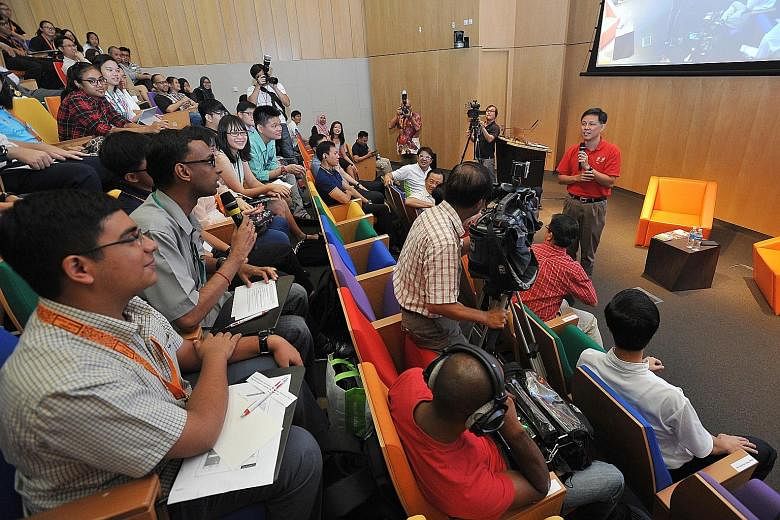Whether Singapore makes it to SG100 will depend on whether citizens feel they have a sense of national identity as one people and a shared obligation to help one another, in particular the less well-off, Minister in the Prime Minister's Office Chan Chun Sing said yesterday.
And the youth should not just ask what the country can offer to help them, but what they can do to make it better, he told over 200 young people at a dialogue on a visit to Geylang Serai ward in Marine Parade GRC.
Mr Chan cautioned against going the way of other countries that are well endowed, but that are divided and see fights over resources.
Participants submitted questions through their smartphones and voted on those they wanted him to respond to. The top issue: Why should the youth want to stay in Singapore till SG100 when the cost of living is high, prompting many to think hard about settling down.
Mr Chan, who is labour chief and deputy chairman of the People's Association, said most Singaporeans at independence in 1965 were committed to the country "even when the chips are down". They did not adopt a "transactional" national identity that hinges purely on the benefits of citizenship.
"Is your staying in Singapore conditional on certain factors, particularly material or otherwise?" he asked the participants. "How many of you will still stay here if, for the next 10 years, we have a serious recession and you cannot fulfil your aspirations, find the jobs you like?
"Your answer to that question will decide whether we have an SG100," he said. The "1965 generation" stayed put in spite of uncertainties and worked to create a nation, he said."If enough of us stay here 'in spite of', then don't worry about SG100 - even SG1000, we will be here," he added. "But if the majority of us are here only because of what the country can give us, then we will be in a very different position."
Mr Chan also said how cohesive Singapore stays depends on whether people think in terms of getting maximum benefit from the state, or if they can accept there are others who need more help. He cited an example from his Meet-the-People Session where, at one table, an elderly man earning $1,000 a month had asked for ComCare aid. At the next, a newly-wed couple in their 20s were angry they did not qualify for additional housing grants as their combined monthly income was $12,000.
He said: "We don't want to end up in a situation like some other places where, even when you have resources to share, people fight over them."
Mr Chan noted that Singaporean identity was not defined through markers like race, language or religion, but through ideals like meritocracy and multiracialism.
Republic Polytechnic student Lim Yi Xuan, 18, said the dialogue made her realise there are no easy answers to some tough questions facing Singapore: "It made me realise that distributing aid equally may not be the most equitable way."
Raffles Institution student Muzammil Arif Jabbar, 17, said Mr Chan's comments were a reminder that the youth had to take an interest in issues affecting Singapore and do their part to ensure it survives.
Mr Chan's visit is part of a series of monthly visits to constituencies by younger ministers, and the first since last year's general election.
He also spoke to residents at Haig Road Food Centre and met community leaders at Khadijah Mosque for a closed-door dialogue.
"It's good for our youth to think about the kind of challenges we will be facing - and how each and every one of us can chip in to play a role towards SG100," he told reporters.
"If you look at the energy that our youth are displaying, you can be very confident that we will be able to face the future with confidence."


